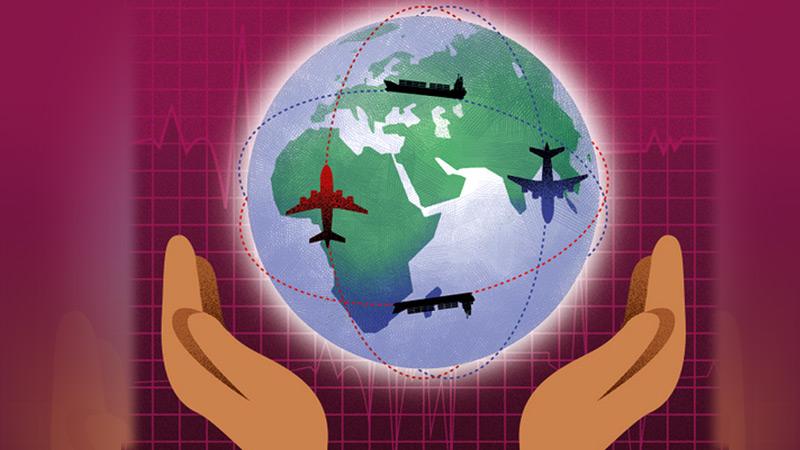
The world will have to learn soon to cope with the effects of globalisation and manage it well to maximise benefits and minimise ill-effects, said Professor in Quantity Surveying, University of Vocational Technology, Chandana Jayalath responding to whether globalisation which had been a buzz word for over two decades would slowdown or be reversed due to the scale of the adverse impact of the current world health crisis on economies.
The integration and interdependence of the world could be seen from the volume of trade which has grown over the years. China which accounted for around 4 percent of global output in 2003 now accounts for over 16 percent, meaning whatever happens to the country, it affects the rest of the world.
“The world will not be able to get out of globalisation. What is imperative is to find ways of managing and governing it. I do not expect globalisation to die a natural death with world economies being tied up as nationalities with veto powers. Yet, one form of unregulated, free-market globalisation is certainly dying while another form that recognises independence and collective action is being born. There will be more pandemics that will force governments to invest in public health institutions and respect the science they represent – with parallel moves on climate change, the oceans, and finance and cyber security.
However, he said it is advisable that the government focuses on village reawakening programs instead of high end investments made on loans. If we put all our effort, inputs and knowledge to improve villages it will boost sustainability.
“We need to strike a balance between inward and outward looking policies, ” Prof. Jayalath said.
As for long term plans to deal with post-covid era challenges, he said Sri Lanka must learn from its regional peers such as China which has leapfrogged in e-commerce.
“We see a significant increase in online activities, such as shopping, entertainment, education, working, socialising and courts in China, thanks to smart devices and digital solutions supporting various aspects of life from home. US agencies such as the Centres for Disease Control and Prevention are encouraging patients to consult doctors using video or phones, to avoid filling waiting rooms,” he said, adding that Sri Lanka should promote telemedicine which will open up opportunities for entrepreneurs to set up back-end operations in inaccessible and remote areas, which in turn would also create job opportunities.
He said online education in universities has already commenced. The health and education sectors should have plans to meet the challenges of accessing digital innovations.
E-learning is in the limelight and it would be the new normal. Drones and robotics are being used in agri-farming in the US and in certain advanced countries. With the breakout of COVID-19, it has gained more traction and robots have replaced a slew of farming activities.
In agriculture, 5G can further enable improvement in the entire value-chain, from precision farming, smart irrigation, improved soil and crop monitoring, to livestock management. Remote operations will be the nucleus of the economy.
“The world will have to re-model its economic fundamentals and Sri Lanka will need to come to terms with it reshaping its policies considering the intensity of the impact of the global pandemic,” he said, adding the loss will ultimately enable us to revisit ourselves, our priorities, and ways of living and working to define a new world order. It will help us get to the bottom of what went wrong and what we had missed.”
He said the world has ignored the environment such as the flora and fauna and taken life for granted. Covid 19 is an eye opener and it is an opportunity to open a new chapter in life.
“We have two choices, the North American and Western style that decides everything on free market capitalism where you get losers and winners and the public healthcare style that becomes the driving force to decisively define livelihood,” Prof. Jayalath said, adding that alternative systems and approaches can be developed, that will not only help manage the current crisis but also create new ways of making human interaction possible.
